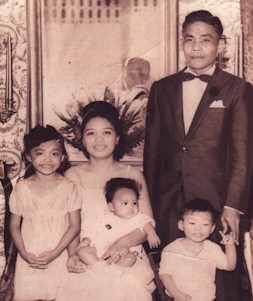Augusto Roa Realuyo b. January 19, 1921
- bino realuyo

- Jan 19, 2025
- 3 min read
Updated: Apr 27, 2025

World War II is a horrifying memory. That a 20 year old Filipino who was pursuing Engineering at the University of the Philippines would be recruited into the United States Armed Forces in the Far East (USAFFE) in 1941 to prepare the Philippines for war is unconscionable. World War II was not the first war inflicted on Philippine soil by a global power. Spain was already there for 333 years when the U.S. took over in 1898. And in 1941 Japan bombed Pearl Harbor and occupied the Philippines. In 1942, my father, Augusto Roa Realuyo found himself in the Fall of Bataan, the Bataan Death March and eventually, a Japanese Concentration Camp in Capas Tarlac. He had just turned 21.
He survived. In human history, survivors held the testimonies. But my father kept them all, having to face the shame of being attached to a historical fact: the Fall of Bataan was the biggest military surrender in American history. To make it worse, the American Congress denied them wartime benefits by passing the Rescission Act of 1946. Where would you go from there? While the world slowly moved forward, leaving the shameful past behind, my father and his peers suffered in fading shadow of war.
When I was born, my father was pushing 50s. Just like many men of war in the Philippines, he married late for reasons only novels could untangle. Even with Engineering and Architecture degrees, he would struggle all his life running from war nightmares and trying to keep a family of five together. The world I grew up in was what anyone would expect in the belly of Manila. All of us characters in the aftermath of World War II.
Bringing his family to America was his last act of forgiveness. He was after all brought here a last resort to reverse chronic and worsened war illnesses that piled on him in his twilight years. That was how our family found ourselves in the fabric of New York and New Jersey. America was his gift to us. It's the other country he fought for. He, just like all Filipinos, was an American national during the war. A history as complicated as our relationship to America. "I Shall Return" was a Filipino mantra during the torments of war, a song of hope.
It was only three years ago that I became brave enough to tackle our legacy of war. While I collected World War II and Bataan books, I couldn't find myself in that trench. I asked my father's spirit to be there with me, every day, at 6am, in coffee shops, writing Bataan New Jersey, before I went to my FT management job. I asked myself what happened before, during, and after 1941. His story had grown much, much bigger. 100 years from 1921-2021: the history of the Philippines against the superpowers that destroyed its young heart makes more sense once human stories are thrown into the fray. And I began to understand my father and his generation more. In the same vein, I also understood the complexity of wars. It's always easy to protest against it, but what happens when it's brought to our doorstep? My father, at 20, knew what he had to do, whether he thought it a calling or a mission.
Our family has sacred months. January because of my father's birth, and April because of the Fall of Bataan and his death on April 26, 2003. I lost him early in life. My first novel came out in 1999, and he would not see my second book. I never told him I was ever interested in writing about Bataan, although I knew that in the genre of WWII, the Filipino voice of Bataan was always missing. Majority of the people who died in the 65 miles of the Bataan Death March were Filipinos. Bataan was always in my blood. I will always be a son of a survivor. It's a legacy I understood when I wrote and published my first novel. Social justice is real for me. It has always been. Not a trope. Not social media virtue signaling. Not armchair activism. History is as complex as the people it railroads. But some of them survive to tell.
Today is his 104th birthday. I thank and honor him. The burden of legacy of telling is Light.






























Comments